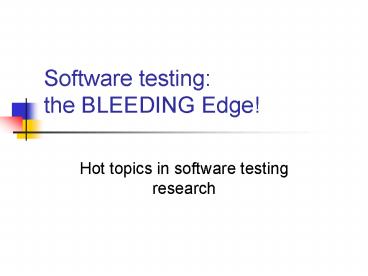Software testing: the BLEEDING Edge PowerPoint PPT Presentation
Title: Software testing: the BLEEDING Edge
1
Software testing the BLEEDING Edge!
- Hot topics in software testing research
2
About me
- Software Engineering Lab, CWRU
- Specializing in software testing/reliability
3
About this talk
- Inspiration
- Different companies have different test
infrastructures - Common goals for improving infrastructure
- Current buzzword (more extensive) automation
- Whats next?
4
About this talk
- Grains of salt
- Im not a psychic
- Im the most familiar with my own research
5
About this talk
- Profiling
- Operational testing
- Test selection and prioritization
- Domain-specific techniques
6
Profiling
- Current profiling tools
- performance/memory
- Rational Quantify, AQtime, BoundsChecker
- test code coverage
- Clover, GCT
7
Profiling Data Flow/ Information Flow
Data Processing
- What happens between the time when a variable is
defined, and when it is used? - Object-Oriented decoupling/dependencies
- Security ramifications
- Trace the impact of a bug
Input Validator
Confidential Data
Web Interface
8
Profiling data flow
- Explicit y x z
- Implicit if(x gt 3)
- y 12
- else y z
9
Profiling function calls
- Count how many times each function was called
during one program execution - Which functions show up in failed executions?
- Which functions are used the most?
- Which functions should be optimized more?
- Which functions appear together?
10
Profiling basic block
- More fine-grained than function call profiling,
but answers the same questions.
- if(someBool)
- x y
- doSomeStuff(foo)
- else
- x z
- doDifferentStuff(foo)
11
Profiling Operational
- Collect data about the environment in which the
software is running, and about the way that the
software is being used. - Range of inputs
- Most common data types
- Deployment environment
12
Profiling
- Kinks to work out
- High overhead
- Performance hit
- Code instrumentation
- Generates lots of data
13
Operational Testing
- Current operational testing techniques
- Alpha and Beta testing
- Core dump information (Microsoft)
- Feedback buttons
14
Operational Testing
- The future (Observation-based testing)
- More information gathered in the field using
profiling - Statistical testing
- Capture/Replay
15
Operational Testing user profiles
- What can you do with all this data?
JTidy executions, courtesy of Pat Francis
16
Operational testing user profiles
- Cluster execution profiles to figure out
- Which failures are related
- Which new failures are caused by faults we
already know about - Which faults are causing the most failures
- What profile data the failures have in common
17
Operational Testing Statistical Testing
- From profile data, calculate an operational
distribution. - Make your offline tests random over the space of
that distribution. - In English figure out what people are actually
doing with your software. Then make your tests
reflect that. - People might not be using software in the way
that you expect - The way that people use software will change over
time
18
Operational Testing Capture Replay
- Some GUI test automation tools, e.g. WinRunner,
already use capture replay. - Next step capturing executions from the field
and replaying them offline. - Useful from a beta-testing standpoint and from a
fault-finding standpoint.
19
Operational Testing
- Kinks to work out
- Confidentiality issues
- Same issues as with profiling
- High overhead
- Code instrumentation
- Lots of data
20
Test Selection/Prioritization
- Hot research topic
- Big industry issue
- Most research focuses on regression tests
21
Test Selection/Prioritization
- Problems
- test suites are big.
- some tests are better than others.
- limited amounts of resources/time/money
- Suggested solution Run only those tests that
will be the most effective.
22
Test Selection/Prioritization
- Sure, but what does effective mean in this
context? - Effective test suites (and therefore, effectively
prioritized or selected test suites) expose more
faults at a lower cost, and do it consistently.
23
Test Selection/Prioritization
- Whats likely to expose faults?
- Or which parts of the code have the most bugs?
- Or which behaviors cause the software to fail
the most often? - Or which tests exercise the most frequently used
features? - Or which tests achieve large amounts of code
coverage as quickly as possible?
24
Test Selection/Prioritization
- Run only tests that exercise changed code and
code that depends on changed code - Use control flow/data flow profiles
- Dependence graphs are less precise
- Concentrate on code that has a history of being
buggy - Use function call/basic block profiles
- Run only one test per bug
- Cluster execution profiles to find out which bug
each test might find
25
Test Selection/Prioritization
- Run the tests that cover the most code first.
- Run the tests that havent been run in a while
first. - Run the tests that exercise the most frequently
called functions first. - Automation, profiling and operational testing can
help us figure out which tests these are.
26
Test Selection/Prioritization
- Granularity
- Fine-grained test suites are easier to prioritize
- Fine-grained test suites may pinpoint failures
better - Fine-grained test suites can cost more and take
more time.
27
Domain-specific techniques
- Current buzzwords in software testing research
- Domain-specific languages
- Components
28
More questions?
- Contact me later melinda_at_melindaminch.com
29
Sources/Additional reading
- Masri, et al Detecting and Debugging Insecure
Information Flows. ISSRE 2004 - James BachTest Automation Snake Oil
- Podgurski, et al Automated Support for
Classifying Software Failure Reports. ICSE 2003 - Gittens, et al An Extended Operational Profile
Model. ISSRE 2004
30
Sources/Additional reading
- Rothermel, et al Regression Test Selection for
C Software. Softw. Test. Verif. Reliab. 2000 - Elbaum, et al Evaluating regression test suites
based on their fault exposure capability. J.
Softw. Maint Res. Pract. 2000 - Rothermel Elbaum Putting Your Best Tests
Forward. IEEE Software, 2003
31
Sources/Additional Reading
- http//testing.com
- http//rational.com
- http//automatedqa.com
- http//numega.com
- http//cenqua.com/clover/
- http//mercury.com
- http//jtidy.sourceforge.net/

